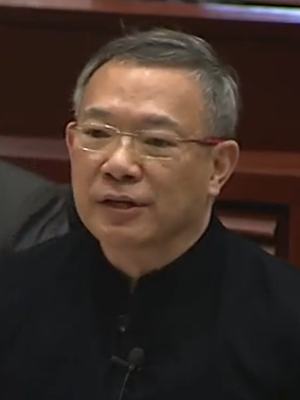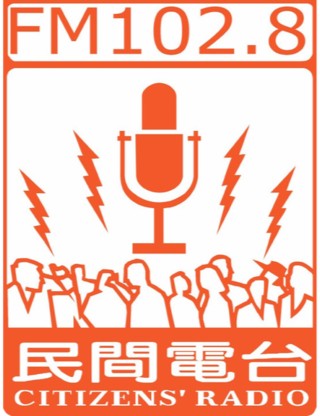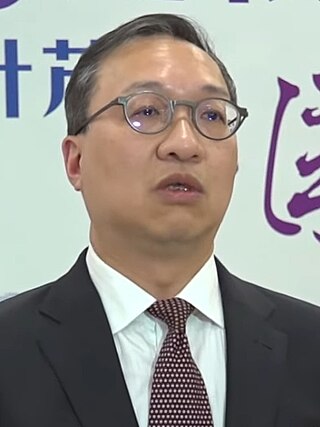Communications in Hong Kong includes a wide-ranging and sophisticated network of radio,television,telephone,Internet,and related online services,reflecting Hong Kong's thriving commerce and international importance.
Hong Kong's media consists of several different types of communications of mass media:television,radio,cinema,newspapers,magazines,websites and other online platforms.

The Education Bureau (EDB) is a policy bureau responsible for formulating and implementing education policies in Hong Kong.

The Hong Kong Bar Association (HKBA) is the professional regulatory body for barristers in Hong Kong. The Law Society of Hong Kong is the equivalent association for solicitors in Hong Kong.

Paul Tse Wai-chun,JP is a Hong Kong solicitor,who claims himself as the "Superman of Law". He also owns a small travel agency and was elected to the Legislative Council of Hong Kong for the tourism functional constituency in the 2008 legislative election. Tse is of Hakka ancestry.

The High Court of the Hong Kong Special Administrative Region is a part of the legal system of Hong Kong. It consists of the Court of Appeal and the Court of First Instance;it deals with criminal and civil cases which have risen beyond the lower courts. It is a superior court of record of unlimited civil and criminal jurisdiction. It was named the Supreme Court before 1997. Though previously named the Supreme Court,this Court has long been the local equivalent to the Senior Courts of England and Wales and has never been vested with the power of final adjudication.

The District Court is the intermediate court system in Hong Kong,having limited criminal and civil jurisdictions. The District Court was established in 1953 with the enactment of the District Court Ordinance. It is located in the Wanchai Law Courts,Wanchai Tower,12 Harbour Road. In the past there were six district courts,namely Victoria,Kowloon,Fanling,Tsuen Wan,Tuen Mun and Sha Tin,before being amalgamated and moved to the same location in March 1991.

The Immigration Department is a disciplined service under the Government of Hong Kong,responsible for immigration control of Hong Kong.

Citizens' Radio was a radio station in Hong Kong established by pro-democracy camp figure Tsang Kin Shing. The station ran as a non-profit organization. It started trial broadcasting on 3 October 2005 on 102.8 MHz FM. The regular broadcasting hours were 7:00 pm–12:00 pm from Monday to Friday. The station ceased to operate on 30 June 2023,with Tsang saying that the station had had trouble inviting guests in view of "so many red lines" –an apparent reference to national security legislation –enacted in 2020,and that due to the blocking of a bank account for receiving donations,the station would be unable to pay rent beyond August.
The Audit Commission (AC) is one of the oldest government departments of the Government of Hong Kong,known as Audit Department before 1 July 1997. The Director of Audit is appointed by the Chief Executive. The Director reports to the Chief Executive,not the Legislative Council. Its main functions are "to provide independent,professional and quality audit services to the Legislative Council and public sector organisations in order to help the Government enhance public sector performance and accountability in Hong Kong." According to the Audit Ordinance the Director of Audit “has wide powers of access to the records of departments”,“can require any public officer to give an explanation and to furnish such information as he thinks fit to enable him to discharge his duties”and “is not subject to the direction or control of any other person or authority in performing his duties and when exercising his powers under the Ordinance.”

The Antiquities Advisory Board (AAB) is a statutory body of the Hong Kong Special Administrative Region with the responsibility of advising the Antiquities Authority on any matters relating to antiquities and monuments. The AAB was established in 1976 along with the Antiquities and Monuments Office (AMO) when the Antiquities and Monuments Ordinance (Cap. 53) was enacted,and comprises members appointed by the Chief Executive. The corresponding governmental ministry is the Development Bureau,and executive support for the AAB is provided by the AMO which is under the Development Bureau.

Although Hong Kong law provides freedom of speech and press,and freedom of expression is protected by the Hong Kong Bill of Rights,the Hong Kong national security law gives the government the power to "take down any electronic messages published" that the government considers endangering national security. The government has blocked several anti-government,doxxing or politically sensitive websites after the commencement of the law,leading to increased concerns of Internet censorship.

The Office of the Communications Authority (OFCA) is an executive arm of the Communications Authority in Hong Kong. It is the body responsible for telecommunications regulation,antitrust enforcement and allocation of the radio frequency portion of the electromagnetic spectrum.

The Commerce and Economic Development Bureau is a policy bureau of the Government of Hong Kong responsible for policy matters on Hong Kong's external commercial relations,inward investment promotion,intellectual property protection,industry and business support,tourism,consumer protection and competition,as well as broadcasting,film-related issues,overall view of creative industries,development of telecommunications,and control of obscene and indecent articles in Hong Kong.

The Constitutional and Mainland Affairs Bureau is a ministerial-level policy bureaux of the Government of Hong Kong responsible for the implementation of the Basic Law,including electoral matters and promotion of equal opportunities and privacy protection. The bureau also functions as the intermediary between the HKSAR Government and the Central People's Government and other Mainland authorities under the principles of "One Country,Two Systems",including the coordination of liaison between the HKSAR Government and Central authorities,promoting regional co-operation initiatives between Hong Kong and the Mainland,and overseeing the operation of offices of the HKSAR Government on the Mainland.

Hong Kong Technology Venture Company Limited is a Hong Kong–based technology company primarily known for its e-commerce platform and once had plans to become a television station. HKTV currently provides an over-the-top shopping and entertainment ("shoppertainment") platform named HKTVMall.

Chris Tang Ping Keung is a Hong Kong law enforcement administrator who has been serving as the Secretary for Security of Hong Kong since June 2021. Tang joined the Hong Kong Police Force in 1987 immediately after his graduation from the Chinese University of Hong Kong with a Bachelor of Social Science in social work. He previously served as the Commissioner of Police of Hong Kong from 2019 to 2021,Deputy Commissioner of Police (Operations) in 2018,and Director of Operations of the Hong Kong Police Force from 2016 to 2018.

Paul Lam Ting Kwok is a Hong Kong Senior Counsel,currently serving as the 5th Secretary for Justice since July 2022.

Tse Chin-wanBBS JP is a Hong Kong government official,current the Secretary for Environment and Ecology.












